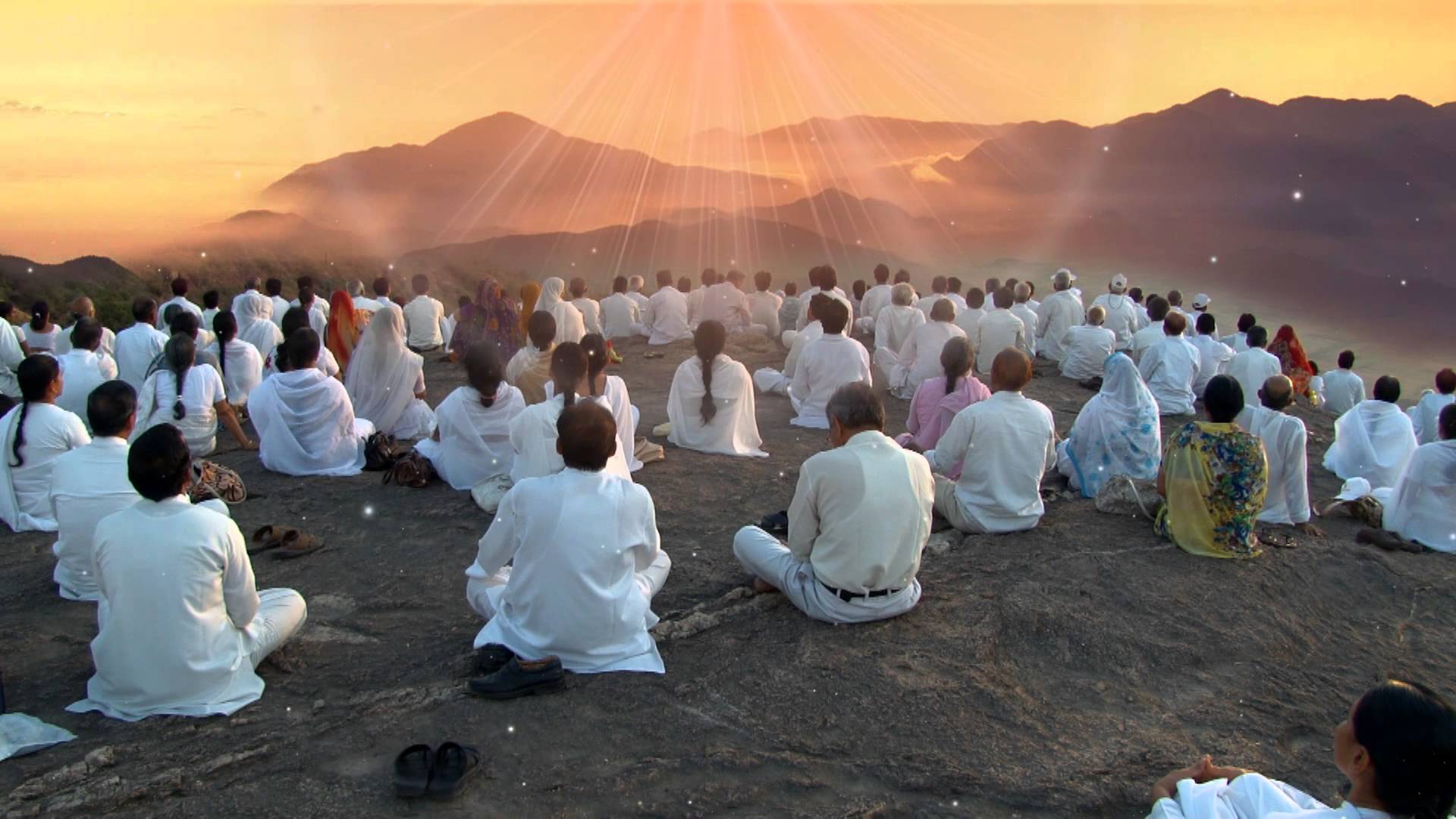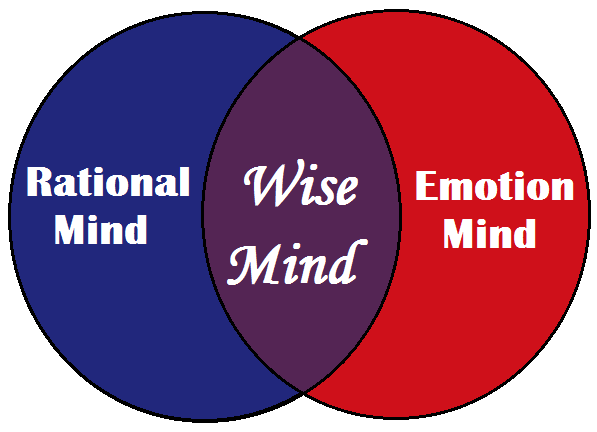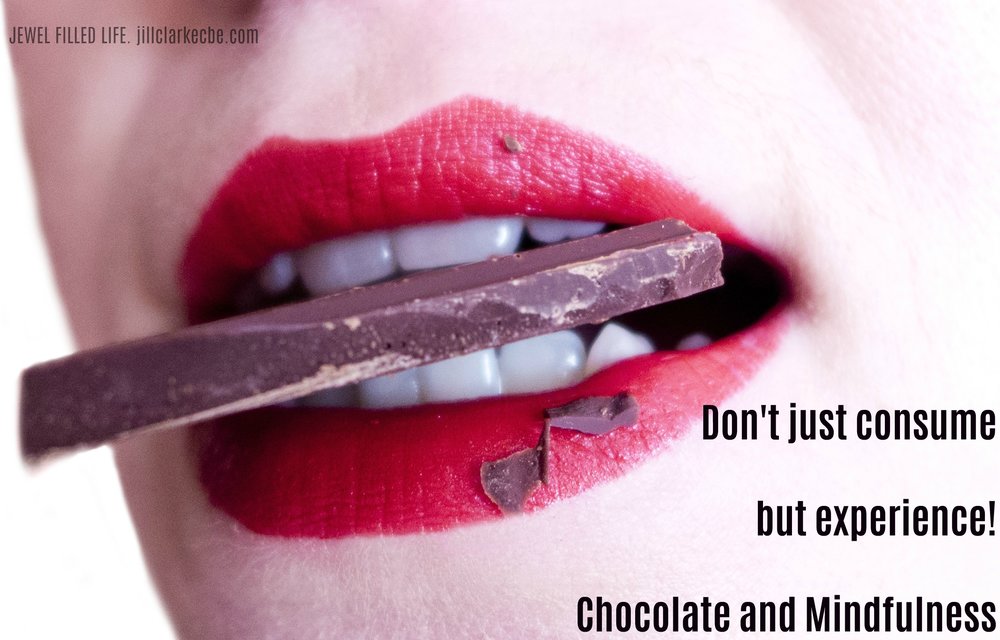mindfulness
Mindfulness to alleviate worry and anxiety
Mindfulness to alleviate worry and anxiety
by Janette Grant 17th May 2018
Regular viewers of our website will have noticed a lack of posts recently and that is because I have been extremely busy dealing with decorating my house ready for sale – why is it our homes only seem to look their best when we are readying them to move on???! Anyway – as I have spent the last few weeks worrying about this and that and trying to be mindful, I thought I would write about how mindfulness can help with our worrying!
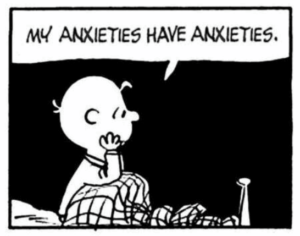
My anxieties have anxieties
Excessive worrying is epidemic and can have terrible consequences on our health. Worry and stress can cause sleep problems, which can seriously affect us; through to physical problems and mental health issues, including anxiety disorders.
It’s a fact though, that 99% of our worry never amounts to anything other than worry! And worry is the cause of an enormous amount of un-necessary stress and emotional distress. Worry can soon become a habit, where we spend our whole life worrying about what might happen. And it’s also true that the majority of serial worriers live well into old age and then look back and wonder what all that worry was for!
‘Worry never robs tomorrow of its sorrow…it only saps today of its joy’
Why DO we worry so much?
There are always times occasionally when our worry is proved right – when our worst fears do happen – and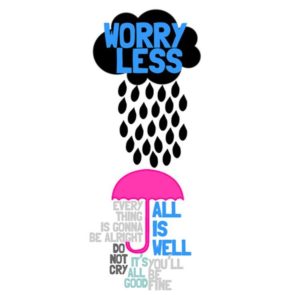 this only needs to happen once for our brain to perceive that we need to worry again and again. Our pre-historic ancestors would have learnt to worry about animal attacks etc and our minds will still react in the same way today, by causing stress and releasing cortisol into our bodies to prepare us for fight or flight. And so that one event, where our worry did come true, burrows into our sub-conscious and emerges to the front of our mind every time we consider a situation that we perceive to be risky, dangerous or possibly heart-breaking.
this only needs to happen once for our brain to perceive that we need to worry again and again. Our pre-historic ancestors would have learnt to worry about animal attacks etc and our minds will still react in the same way today, by causing stress and releasing cortisol into our bodies to prepare us for fight or flight. And so that one event, where our worry did come true, burrows into our sub-conscious and emerges to the front of our mind every time we consider a situation that we perceive to be risky, dangerous or possibly heart-breaking.
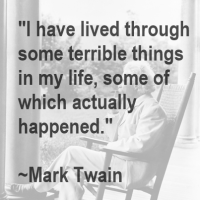
‘I have lived through some terrible things in my life, some of which actually happened’ – Mark Twain
But we should take a moment to remember all the times we worried about something happening…and yet nothing did. And remember all the times when, despite our worries, things actually turned out very well and life has been great. Maybe some of us may feel that life has never been very kind and that we have good reason to worry, as bad things do always happen? If so, maybe we should consider that our worry is perpetuating a cycle of negativity; that by the mere fact of thinking the worst will happen, we will attract more of the negativity to us – the world is a mirror of energy and the law of attraction states that what we focus on is what we attract.
So how can Mindfulness help us with our worries?
Obviously, worrying before a big life event is natural and all part of life. It can be a positive effect to get the adrenaline pumping to feel alive and kicking and it’s perfectly normal to worry a little about falling ill or hurting ourself – for example when we’re climbing ladders, (as I have been doing the past few weeks) it helps to make us take more care! This is an important part of our self-preservation wiring.
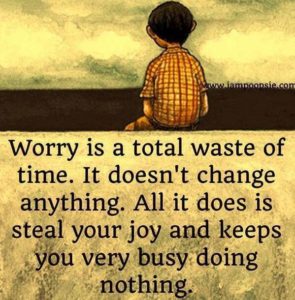
Worry is a total waste of time. It doesn’t change anything. All it does is steal your joy and keeps you very busy doing nothing.
But excessive, habitual worrying will never help anyone; it will never get us out of a danger area; never improve a situation, nor help us devise a strategy for improvement.
Those people who are excessive worriers should try to remember these mindful affirmations when worry and anxiety is taking over and present a logical argument to their state of mind:
- Worrying is unnecessary and will affect my health and happiness
- Worrying is preventing me from seeing clearly and taking positive, appropriate action.
- Worrying will mean I make irrational decisions based on worries about things that haven’t yet happened and most likely never will.
- Worrying will not lead me to prosperity, in any part of my life. No matter how much I worry it will not make the situation better.
- Worrying is infectious – it only make others worry too, which creates unnecessary stress.
There are always ups and downs in every life, but our brain naturally tends to amplify the sorrows and minimise the joys. When our brain perceives something as bad, it begins to worry, and then often, when there is no real foundation for this worry, it can prevent us from fully noticing and experiencing the joys we encounter. It is difficult to fully concentrate on anything when we have distracting, persistent negative thoughts running through our minds, which in turn prevents us from paying attention or relaxing.
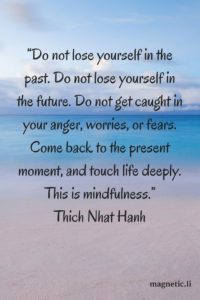
‘Do not lose yourself in the past. Do not lose yourself in the future. Do not get caught in your angers, worries or fears. Come back to the present moment, and touch life deeply. This is mindfulness.’ – Thich Nhat Hahn
A recent study has shown that the most effective technique for reducing the frequency of intrusive, negative thoughts was a guided acceptance-based mindfulness meditation. This technique teaches us to allow thoughts to come into our mind, observe, acknowledge and then accept them – rather than struggle with them. This method has been formalised into acceptance and commitment therapy and we can practice these techniques ourselves through guided meditations that encourage acceptance. It is important to practice as regularly as possible to elicit lasting changes in the brain – both biologically and psychologically. In comparison to meditation beginners, more experienced meditators have been found to have different levels of brain activity and cortical thickness in ares of the brain relating to emotional regulation and self-awareness. This suggests that the more consistently and regularly we practice, the more mindfulness meditation can help.
How do we learn to worry less?
Make no mistake – Mindfulness will not ‘cure’ worrying, but it can teach us to get better at recognising it, when we can then guide ourself back to the things that really matter – and we could actually end up worrying less. Some hints we need to remember are:
- We should try to understand the nature of worrying – the whole premise of worry is the mind’s attempt to anticipate and protect us from potential dangers to keep us safe – which means that worrying is not necessarily all bad. But it’s when worrying becomes over-excessive, and begins to affect our nervous system, that it can lead us into a destructive vicious circle of more worrying.
- We must learn to allow/accept the feeling – when we worry we create fear and anxiety and we need to simply recognise and acknowledge this feeling. We do not want to resist it, since what we resist persists – instead we need to practice just allowing it to be. We would just say to ourself ‘allowing, allowing, allowing’.
- We feel into it with kindness – once we recognise the feeling we need to investigate it and deepen
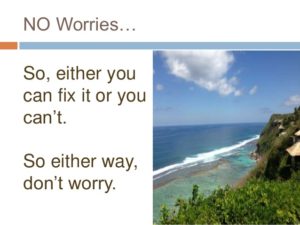
No worries….so, either you can fix it or you can’t.
So either way, don’t worry.our awareness of it. We could put our hand on our heart or wherever we feel the sensation in our body and this will send a signal to our brain of a sense of kindness/love for the feeling, which may be enough to dissipate it all by itself. The brain will link the physical sensation of the loving touch with the mental worries and then reduce the sound of our negative thoughts. We could ask ourself ‘What does this feeling believe?’ Is it saying that we are unloveable or unworthy? Ask ourself ‘What does this feeling need right now?’ Does it need to feel cared for, to feel secure or a sense of belonging? Whatever it needs, we can practice planting the seeds of intention in ourself by saying ‘May I feel safe and secure, may I be free from this fear, may I feel a sense of belonging’. We can make this personal to whatever our needs are.
- We should extend our awareness and good wishes out to everyone – whatever we are worrying about we should remember we are not alone. Feeling vulnerable is normal and everyone feels it at different stages of their life. When we feel vulnerable it is important to remember that it’s not just all about us – we need to realise that everyone else around us also struggle with worry and so wish them all the same good intentions that we wish for ourself. We should say to ourself ‘May we all feel a sense of safety and security. May we all be free from the fear that keeps us trapped in a perpetual cycle of worry. May we all feel that sense of belonging’.
- Practice all the time – once we remember to practice this every time we are aware we are worrying, we will notice that we begin to become less affected by our worried mind, more compassionate with ourself when it happens, and have the perspective that worrying is all part of being human and we are not alone.
How staying present in the moment can help reduce worry and stress
A simple, but not easy way of keeping the little worry gremlins away is to practice staying present in each

At some point you just have to let go of what should happen and live in what is happening right now
moment’s experience. We tend to worry about what may happen in the future or occasionally something that happened in the past and it is therefore almost impossible to worry when our mind is focusing on the present. But staying present isn’t easy – there are lots of distractions in our lives, which doesn’t help us to stay focused, and worry can help us anticipate dangerous situations, which makes it harder to turn off the worrying.
Mindfulness is one of the best ways to practice staying in the present and we can practice mindful awareness of the present moment at any time in our day. We could use our mobile as a useful reminder to return to the present moment by setting reminders during the day. Then when the reminder goes off, we should stop and focus our awareness on the present moment, checking in with ourself about how we are feeling emotionally and physically and what we are thinking about. Mindfulness is about being accepting, non-critical and open, so we should be kind to ourself and just curious about our experience. We may notice that we are worrying about the future and we should use these times as an opportunity to return to the present moment. Remember that whatever happens in the future, we will handle it!
And whilst there are many ways to slow down and be more present, the way to cut down worrying is merely to remember to do so.
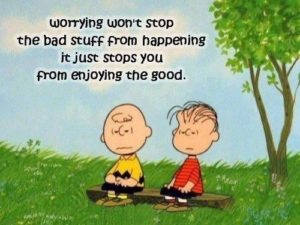
‘Worrying won’t stop the bad stuff from happening. It just stops you from enjoying the good’ – Charlie Brown
5 Points to remember to help us stop worrying and be more mindful:
- We are not our thoughts – they are not real, they are just thoughts and sometimes can be completely daft! It is not true just because we think it!
- Observe, then accept – acknowledge the thoughts, but then just let them float by like leaves in a stream. Don’t struggle with them.
- Don’t distract, but immerse – leave our emails, there’s no need to check them every two minutes! Instead, notice the world around us and tune into our senses – that’s what’s real. Our thoughts and what we concoct in our heads about the world is not!
- Take note of and name intrusive thoughts – sometimes thoughts will keep returning to nag us. Just acknowledge them and give them a funny name.
- Always come back to our senses – paying full attention to the world around us and the people connected to us. When we can let thoughts float away, we can truly focus our attention on those we love and care about.
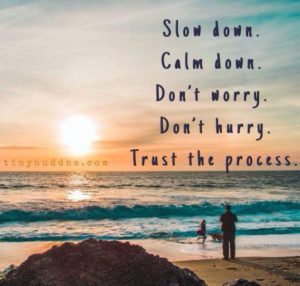
Slow down Calm down Don’t worry Don’t hurry Trust the process
When we realise that mind and heart are the same word in many Asian languages, we can understand that mindfulness could also be translated as heartfulness, so we just need to learn to let our worries float by and concentrate on our loved ones.
Some books to expand on dealing with our worries are:
The Easy Way to Mindfulness: Free your Mind from Worry and Anxiety – Allen Carr’s Easyway book strips away the illusions that leave us open to negative thoughts and behaviours and shows us how to gain clarity and control when we focus on who we truly are rather than being distracted by things that harm and trouble us. Mindfulness is at the heart of his philosophy and these principles provide a tangible, practical outcome – our happiness.
Mindfulness for Beginners – How to Live in the Moment, Stress and Worry Free in a Constant State of Peace and Happiness – this book teaches us how to take control of our thoughts, stop worrying, relieve stress and embrace a more peaceful way of living. We learn how to be mindful, how to use mindfulness techniques to quiet our mind and how to practise mindfulness every day to take control of our life.
Managing Anxiety with Mindfulness for Dummies – this is a practical guide to overcome our worries and minimise anxiety using mindfulness techniques. This book teaches simple techniques that can help change the way you think, feel, and act. It explains the benefits of mindfulness and how it can help us face our fears and dispel persistent, irrational worries.
Tiny Buddha’s Worry Journal: A Creative Way to Let Go of Anxiety and Find Peace – this interactive journal helps us de-stress, reduce anxiety, and find peace. It is filled with prompts, quotes, questions for reflection, and colouring pages, which will help us feel calmer and develop a mindful, peaceful spirit every day.
mindfulness
50 Mindfulness quotes

50 Mindfulness quotes to inspire and uplift us!
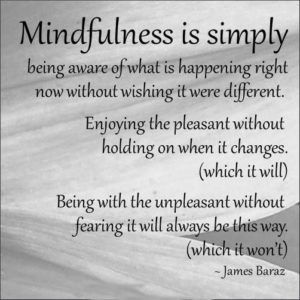
‘Mindfulness is simply being aware of what is happening right now without wishing it were different.
Enjoying the pleasant without holding on when it changes (which it will).
Being with the unpleasant without fearing it will always be this way (which it won’t). – James Baraz
by Janette Grant 16th June 2018
Sometimes all we need is a visual reminder to keep us focusing on the present moment, so I thought I’d bring us a page of mindfulness quotes to give us a little extra inspiration. A good quote can quickly sum up something meaningful in just a few words and may even help us to understand mindfulness better.
Here are some of my favourite quotes from many of the main mindfulness leaders, and others, about being mindful in general:

‘The little things? The little moments? They aren’t little’ Jon Kabat-Zinn

‘Mindfulness is a way of befriending ourselves and our experience’ Jon Kabat-Zinn
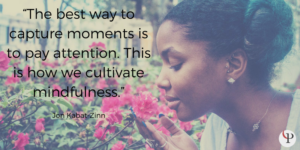
‘ The best way to capture moments is to pay attention. This is how we cultivate mindfulness’ Jon Kabat-Zinn

‘The moment one gives close attention to anything, even a blade of grass, it becomes a mysterious, awesome, indescribably magnificent world in itself.’ – Henry Miller

‘Don’t let life harden your heart’ – Pema Chödrön
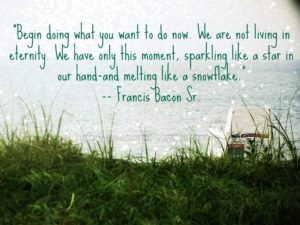
‘Begin doing what you want to do now. We are not living in eternity. We have only this moment, sparkling like a star in our hand – and melting like a snowflake.’ – Francis Bacon Sr.

‘Nothing is worth more than this day. You cannot relive yesterday. Tomorrow is still beyond your reach.’ – Johann Wolfgang von Goethe
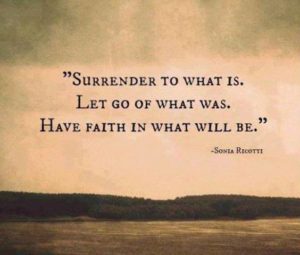
‘Surrender to what is. Let go of what was. Have faith in what will be’ – Sonia Recotti

Mindfulness means purposely paying attention, in the present moment, without making any kind of judgment’
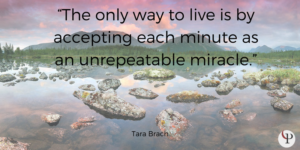
‘The only way to live is by accepting each minute as an unrepeatable miracle’ – by Tara Brach
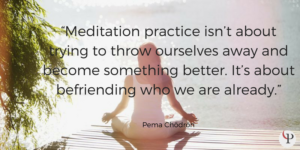
‘Meditation practice isn’t about trying to throw ourselves away and become something better. It’s about befriending who we are already.’ – Pema Chödrön
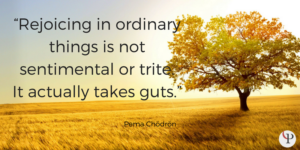
‘Rejoicing in ordinary things is not sentimental or trite. It actually takes guts.’ – by Pema Chödrön
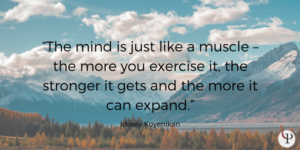
‘The mind is just like a muscle – the more you exercise it, the stronger it gets and the more it can expand.’
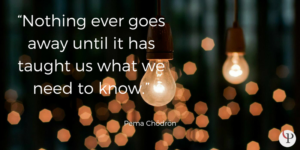
‘Nothing ever goes away until it has taught us what we need to know’ – Pema Chödrön

‘Treat everyone you meet as if they were you’
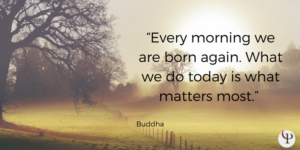
‘Every morning we are born again. What we do today is what matters most.’ – Buddha
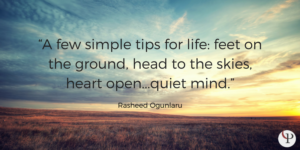
‘A few simple tips for life: feet on the ground, head to the skies, heart open, quiet mind’ – Rasheed Oguniaru
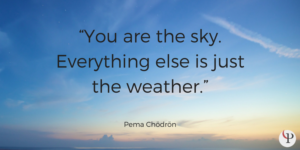
‘You are the sky, everything else is just the weather’ – Pema Chödrön
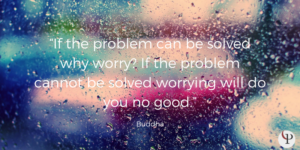
‘If the problem can be solved why worry? If the problem cannot be solved worrying will do you no good’ – Buddha
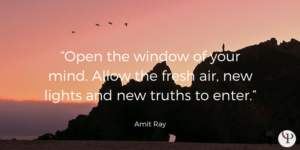
‘Open the window of your mind. Allow the fresh air, new lights and new truths to enter’ – Amit Ray
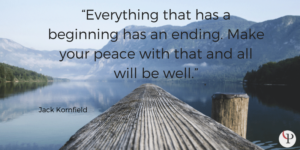
‘Everything that has a beginning has an ending. Make your peace with that and all will be well. – Jack Kornfield
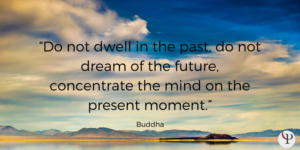
‘Do not dwell in the past, do not dream of the future, concentrate the mind on the present moment’ – Buddha
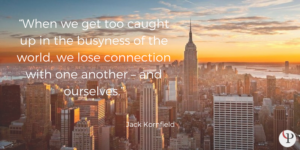
‘When we get too caught up in the busyness of the world, we lose connection with one another – and ourselves’ – Jack Kornfield
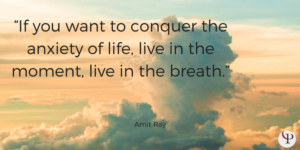
‘If you want to conquer the anxiety of life, live in the moment, live in the breath’ – Amit Ray
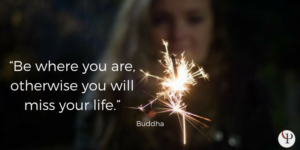
‘Be where you are, otherwise you will miss your life’ – Buddha
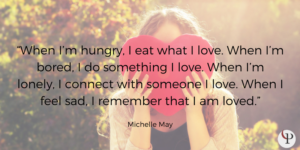
‘When I’m hungry, I eat what I love. When I’m bored, I do something I love. When I’m lonely, I connect with someone I love. When I feel sad, I remember that I am loved’ – Michelle May
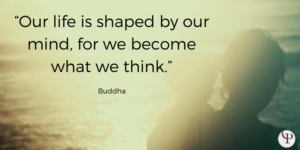
‘Our life is shaped by our mind, for we become what we think’ – Buddha
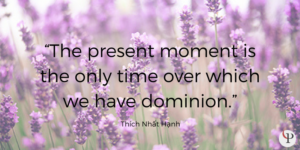
‘The present moment is the only time over which we have dominion’ – Thich Nhãt Hanh
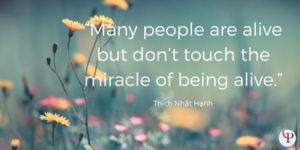
‘Many people are alive but don’t touch the miracle of being alive’ – Thich Nhãt Hanh
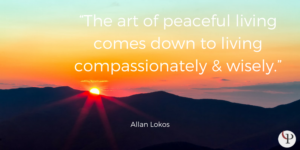
‘The art of peaceful living comes down to living compassionately and wisely.’ – Allan Lokos
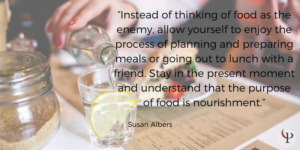
‘Instead of thinking of food as the enemy, allow yourself to enjoy the process of planning and preparing meals or going out to lunch with a friend. Stay in the present moment and understand that the purpose of food is nourishment.’ – Susan Albers
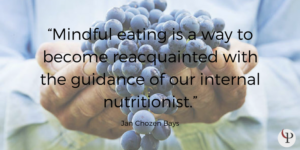
‘Mindful eating is a way to become reacquainted with the guidance of our internal nutritionist.’ – Jan Chozen Bays
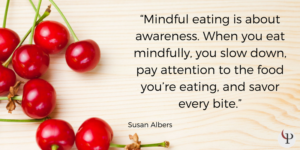
‘Mindful eating is about awareness. When you eat mindfully, you slow down, pay attention to the food you are eating, and savor every bite.’ – Susan Albers
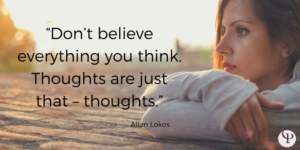
‘Don’t believe everything you think. Thoughts are just that – thoughts.’ – Allan Lokos
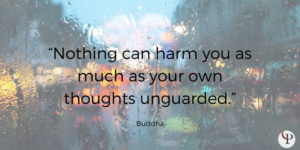
‘Nothing can harm you as much as your own thoughts unguarded.’ – Buddha
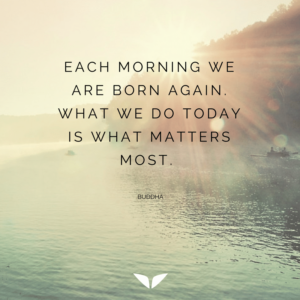
‘Each morning we are born again. What we do today is what matters most.’ – Buddha

‘You only lose what you cling to.’ – Buddha
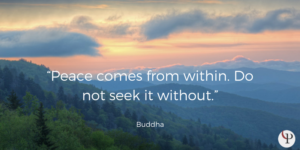
‘Peace comes from within. Do not seek it without.’ – Buddha
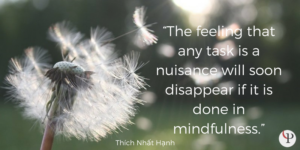
‘ The feeling that any task is a nuisance will soon disappear if it is done in mindfulness.’ – Thich Nhãt Hanh
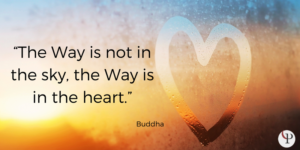
‘The Way is not in the sky, the Way is in the heart’ – Buddha

‘What you think you Become.’
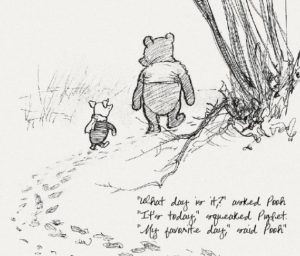
‘”What day is it?” asked Pooh. “It’s today.” squeaked Piglet. “My favourite day” said Pooh’
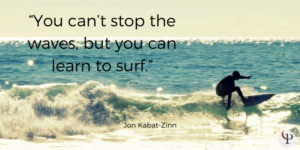
‘You can’t stop the waves, but you can learn to surf.’ – Jon Kabat-Zinn
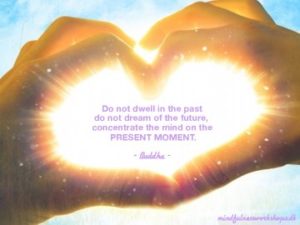
‘Do not dwell in the past, do not dream of the future, concentrate the mind on the present moment.’ – Buddha
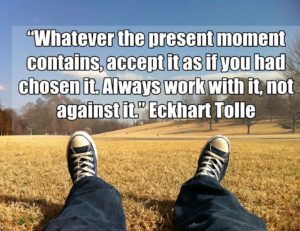
‘Whatever the present moment contains, accept it as if you had chosen it. Always work with it, not against it.’ – Eckhart Tolle
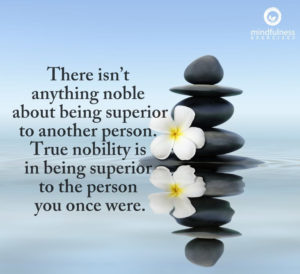
‘There isn’t anything noble about being superior to another person. True nobility is in being superior to the person you once were.’
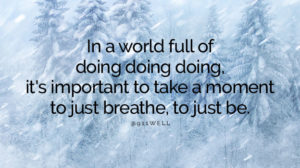
‘In a world full of doing doing doing, it’s important to take a moment to just breathe, to just be.’
I hope that the above quotes were inspiring to you, and especially hope that they have given you something new to reflect on for your mindfulness practice. I love to concentrate on a different quote every day and it definitely helps to have the image in my mind, along with the quote, to help me focus on the words.
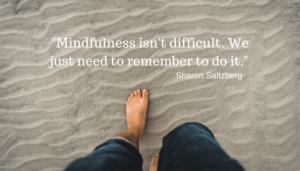
‘Mindfulness isn’t difficult…We just need to remember to do it.’ – Sharon Salzberg
If you’d like to continue exploring more inspirational quotes these will help you develop more mindfulness:
The Little Book of Wisdom: Change Your Outlook One Day at a Time – this is a collection of advice and teachings from the Dalai Lama, with his helpful insights on daily living, compassion and inner peace. Whatever our beliefs, his words have the power to calm and inspire us all.
Mindfulness Quotes: Thoughts for Meditation, Inner Peace and Change – short, powerful and easy to remember quotes, which make you think, meditate and help us live and feel our lives to their optimum. There are words of wisdom from Buddha, the Dalai Lama, Thich Nhãt Hanh and Jon Kabat-Zinn will show us how to live the present moment.
Mindfulness Affirmation Cards – create a clear, positive mindset with a pocketful of inspiration! These mindfulness cards feature beautiful images of nature and by helping us to focus on the present moment, we can calmly find peaceful resolutions to situations. They can help us monitor our thoughts and emotions, when we can progress to feeling more balanced, to bring calm and serenity to our lives.
exercises
11 Mindfulness Exercises

Mindfulness Exercises
by Janette Grant 16th June 2018

I talked about mindfulness meditation in my last post and it’s the big thing at the moment, but sometimes in this busy world of ours we just don’t have the time for a long, formal practice; our mind is constantly scattering our thoughts and emotions, leaving us feeling stressed, highly strung and often very anxious.
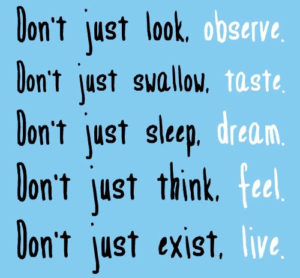
‘Don’t just look, observe.
Don’t just swallow, taste.
Don’t just sleep, dream.
Don’t just think, feel.
Don’t just exist, live.
It is unfortunate then, that most of us struggle to find five minutes to relax and meditate, let alone 30 minutes or more for a meditation session. Studies have shown how mindfulness meditation has many benefits, including reducing depression and pain, easing stress, accelerating cognition, increasing creativity and much more. So it is essential for our well-being to schedule a few minutes every day to cultivate mental spaciousness and achieve a positive mind-body balance.
Mindfulness exercises help us to become more aware of our more difficult and painful thoughts and feelings. The exercises can give us a sense of control over our thoughts, rather than feeling that we are controlled by them.
So…a quick and easy way to introduce some mindfulness meditation into our day is to do a few, simple mindfulness exercises, to empty our minds, to find some precious calm, and which can be slipped into our daily routine without having to always find time for some more formal mindfulness meditation.
11 examples of some easy mindfulness exercises are:
- Mindful walking – those of us who do regular walking every day – whether walking to work or
 walking the dog etc – can incorporate some walking mindfulness into the routine. Focus the attention on the sensation of our feet on the ground and our breath as we move. We can also move our attention to other parts of our body. The important thing is to have a relaxed attention.
walking the dog etc – can incorporate some walking mindfulness into the routine. Focus the attention on the sensation of our feet on the ground and our breath as we move. We can also move our attention to other parts of our body. The important thing is to have a relaxed attention. - Mindful eating – we all eat regularly of course and we can practise mindful eating whilst doing so. When we take the first bite, we should take a moment to pay attention to the taste – really savouring it. We can look at our food carefully, feel the textures, smell it and notice how our body reacts. We don’t need to do this all through the meal! We should just practise it occasionally.
- Mindful mini-break – instead of using our break between tasks to check our email/ Facebook etc we should practise a mindfulness exercise. We could sit for a moment to notice the sensations in our mind and body. Pay attention to how we feel and what we can hear. Try to be as present as possible and when our mind wanders (and it will), gently bring it back to the present and be in the moment.
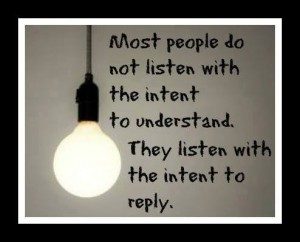
‘Most people do not listen with the intent to understand. They listen with the intent to reply’
- Mindful listening – we very quickly get used to a lot of sounds and learn to tune them out, so when we have the opportunity, we should try some mindful listening. Pay attention to what we can hear around us or put on some music and really listen to it for a while. Our mind may try to wander to things the music reminds us of, or try to think about the lyrics too much, but we should just let the music flow over us.
- Mindful brushing – some habits are mostly done in such a perfunctory way that we hardly notice them! But tonight, instead of allowing our mind to wander off whilst we brush our teeth, we could focus instead on actually experiencing it. Notice how the brush feels on our teeth and the taste of the toothpaste. We can include any chore, such as washing the dishes, or a routine shower, and incorporate mindfulness into the process – bringing our mind back to the present when it wanders off.
- Mindful breathing – we can choose any moment during our day to focus on one breath – perhaps in
 the few seconds before answering the phone or when standing in line somewhere. We can focus our attention on how it feels when we breathe in and breathe out, noticing on how the air expands our chest and abdomen. It’s just a simple, little reminder for our mind to be present.
the few seconds before answering the phone or when standing in line somewhere. We can focus our attention on how it feels when we breathe in and breathe out, noticing on how the air expands our chest and abdomen. It’s just a simple, little reminder for our mind to be present. - Mindful observation – this exercise can help us notice and appreciate our environment in a deeper way. It helps us to connect with the beauty around us, which is often overlooked when we are rushing around. We should choose an object, such as a flower, and focus on it for a minute or two, simply relaxing into watching it for as long as our concentration allow. Look at it as if it’s the first time it’s ever been seen and explore every aspect of it, connecting with its energy and purpose with the world.
- Mindful awareness – similar to mindful brushing, the aim here is to bring a more heightened awareness and appreciation to the everyday simple tasks we do and the results they achieve. Maybe something as simple as opening a door for example, where just as we touch the doorknob to open the door, we can stop for a moment and be mindful of where we are, how we feel in that moment and where the door leads. Or, maybe each time we smell food, we could take a moment to stop and be grateful to have good food to eat and share with our family. It doesn’t have to be a physical touch point cue though – it could be that each time we have a negative thought, we could take a moment to stop, label the thought as unhelpful and release the negativity. Just choose some touch points at some moments in the day to stop and cultivate awareness of what we are doing and the blessings those actions bring to our lives.

‘Today I will live in the moment’
- Mindful Immersion – the thinking behind this exercise is to build contentment in the moment, instead of our normal constant striving to finish one task just to get on with another! We need to take that regular chore and pay attention to every detail – experiencing it like we never have before. For example, when cleaning the house we should feel the motion when brushing up, sense the muscles we are using etc and discover new experiences within this familiar task. Instead of just working through and thinking about finishing the task, we should become aware of every step – fully immersing ourself into the process. We might even end up enjoying the cleaning for once!
- Mindful senses – a simple mindfulness exercise is to focus our awareness through our three senses

How to use your senses to be mindful
of sound, sight and touch on what we are experiencing right now. Taking a few breaths we should think: What are three things I can hear? What are three things I can see? What are three things I can feel? Think about these answers slowly, one sense at a time – it’s impossible to do this without being present and mindful.
- Mindful Appreciation – for this exercise we need to notice five things that we normally overlook – these can be people or objects or a mixture of both. The idea of this is to simply be thankful and appreciate the seemingly insignificant things in our life that support our existence, but that which we hardly give a second thought in our constant craving for bigger and better things. Even something as simple as the electricity that powers our kettle can be appreciated, but how often do we stop to think about how it exists or how it works? Have we recognised how it benefits our life and others? Have we thought about what life would be like without it and how everything is interconnected in this world of ours. I recently watched read a book where the first attack aliens used was to block all electricity in the world and it wasn’t until I truly sat and thought about how much we rely on it that I fully appreciated what it would mean to be without it! There is a saying: ‘If we woke up tomorrow ONLY with the things we were grateful for today, what would we have?’ Makes you think doesn’t it?! So…we should identify our five things and then endeavour to find out everything we can about their creation and purpose, so we can truly appreciate how they support our lives.
These items are great to help us expand our choice of simple little exercises we can use daily:
Mindfulness Pocketbook: Little Exercises for a Calmer Life – this little book has over 100 quick exercises for a wide range of situations in our lives, to help us become calm, collected and present. It will help us develop more mindful thinking, which will benefit us in our personal, social and work life.
The Little Book of Mindfulness: 10 minutes a day to less stress, more calm – these simple 5 and 10 minutes practises will help us rid ourselves of stress and find a more mindful, peaceful and relaxed life.
Stress Less Cards: 50 Inspirational Mindfulness & Meditation Cards – these cards contain 50 effective exercises to help us relieve stress and deal with anxiety whenever we need it. The techniques can be easily memorised and used anywhere to stop that stress reaction and help us relax.
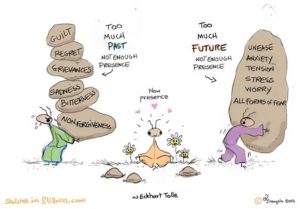 If we can regularly practise the above simple exercises every day for just a few minutes, we will develop a moment-by-moment awareness of our surroundings, which will help us better cope with all the negative thoughts and feelings that create stress and anxiety in our life. When we can control our ability to keep our mind in the present moment – instead of being led subconsciously by our emotions influenced by negative past experiences and fears of future occurrences – we can deal with all life’s challenges in a clear-minded, calm and assertive manner.
If we can regularly practise the above simple exercises every day for just a few minutes, we will develop a moment-by-moment awareness of our surroundings, which will help us better cope with all the negative thoughts and feelings that create stress and anxiety in our life. When we can control our ability to keep our mind in the present moment – instead of being led subconsciously by our emotions influenced by negative past experiences and fears of future occurrences – we can deal with all life’s challenges in a clear-minded, calm and assertive manner.
We will then expand into a fully conscious mind-set where we can escape from unhelpful, self-limiting thought patterns and become fully present to focus on positive emotions that will increase our compassion and understanding of ourselves and others.

meditation
100% Mindfulness meditation: what it does for us!

Mindfulness meditation and its health benefits
by Janette Grant 1st June 2018
What is mindfulness meditation? How often do we hear about meditation and mindfulness or even mindfulness benefits these days? The words are frequently  interchangeable and often, in a simplified way, refer to the similar idea – that of calming our frenzied minds. Mindfulness and meditation complement each other, like two sides of the same coin and they often overlap. But each also has its own specific definition and purpose and the main difference is that meditation is the large umbrella term for the practice of reaching ultimate consciousness and concentration, to acknowledge the mind and self-regulate it. It can involve many techniques to achieve this – one of which, is mindfulness. So mindfulness is a form of meditation, along with yoga, silence, breathing etc. There are many forms of meditation, but with mindfulness we bring our full mind to the present and focus completely on the moment. Being mindful of our breath, for example, is a common form of mindfulness during meditation and this improves our awareness of being in the present – this is called mindfulness meditation, or mindfulness buddism.
interchangeable and often, in a simplified way, refer to the similar idea – that of calming our frenzied minds. Mindfulness and meditation complement each other, like two sides of the same coin and they often overlap. But each also has its own specific definition and purpose and the main difference is that meditation is the large umbrella term for the practice of reaching ultimate consciousness and concentration, to acknowledge the mind and self-regulate it. It can involve many techniques to achieve this – one of which, is mindfulness. So mindfulness is a form of meditation, along with yoga, silence, breathing etc. There are many forms of meditation, but with mindfulness we bring our full mind to the present and focus completely on the moment. Being mindful of our breath, for example, is a common form of mindfulness during meditation and this improves our awareness of being in the present – this is called mindfulness meditation, or mindfulness buddism.
The practice of meditation predates mindfulness, which is often aligned with the Buddha when he discovered that focusing completely on his breath allowed him to see reality and reach meditation quicker. Whereas meditation is thought to have its origins in prehistoric religions.
What are the health benefits of combining both mindfulness and meditation?
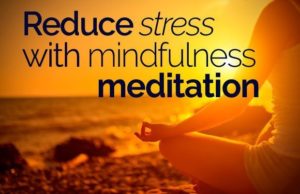
Reduce stress with mindfulness meditation
There is much evidence to suggest that harnessing our mind to be in the present can improve our mental and physical health. A recent study has found that practicing mindfulness can have a positive affect on glucose levels, showing that improved focus and self control can help fight obesity and unhealthy eating habits. Mindfulness meditation has also been linked to improved sleep quality amongst older adults who would normally end up using sleeping pills. It has been associated with improved focus, reduced dependency on opioid drugs and lowered anxiety and depression levels. And even more impressive is that research has recently shown that mindfulness exercises and positive thinking can have a beneficial effect on the DNA of breast cancer patients, which suggests that mindfulness meditation can have an even more extensive effect on our bodies than we even thought! 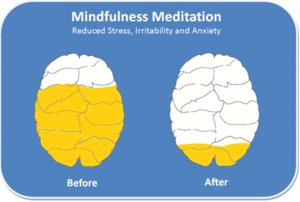
Mindfulness meditation helps us become aware of what is already true moment by moment, rather than attempting to make us different from how we are -mindfulness training additionally present with whatever is happening in our lives – no matter what that is. How does that help? Surely we want to suffer less and tune into the natural wisdom? Isn’t that making changes from how we are? Well yes…it is…suffering less and becoming more aware of our inherent wakefulness are changes from how we experience ourself most of the time, but…the only way to alleviate suffering and find our inherent wisdom is to dig more deeper into the present moment and into ourselves as we already are – not by trying to change what is happening.
Buddhists teaches how to practice mindfulness in helping escape from our direct experience; we try to get away from our pain and hang on to pleasure, but this just perpetuates our suffering. And we cause more suffering when we try to hang on to our ego.
Instead, when practising mindfulness meditation – paying precise, nonjudgmental attention to our experiences as they happen – we do not reject anything. In this way, we do not struggle to get away from difficult experiences – we merely practise being able to be with them. Equally importantly, we need to practise mindfulness during pleasant experiences as well; we often struggle to simply stay present with happiness and instead turn it into worrying that it won’t last or we try to keep it from disappearing.
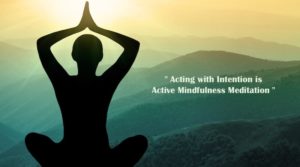
Acting with intention is Active Mindfulness Meditation
When we are mindful, we show up for our lives; we don’t miss them through distraction or in wishing things could be different. Instead, if something needs changing, being mindful means that we are present enough to understand what needs to be done. But being mindful should not prevent us from actually participating in our lives and taking care of our own and others’ needs; the more mindful we are, the more compassionate we will be.
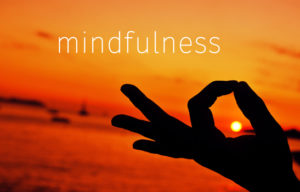 Remember – mindfulness meditation is all about being mindful of whatever happens. It is not about trying to stop ourselves thinking – this is not the aim. Many people think that meditation is about emptying our mind, but this is certainly not true for mindfulness meditation. So remember…when you are aware of thoughts running through your mind (and they will), just include them in what you notice…don’t try to get rid of them. It won’t work anyway, and it’s not what mindfulness meditation is about. We are just trying to be with ourselves as we are – not trying to change ourselves into some preconceived idea of what we think we should be.
Remember – mindfulness meditation is all about being mindful of whatever happens. It is not about trying to stop ourselves thinking – this is not the aim. Many people think that meditation is about emptying our mind, but this is certainly not true for mindfulness meditation. So remember…when you are aware of thoughts running through your mind (and they will), just include them in what you notice…don’t try to get rid of them. It won’t work anyway, and it’s not what mindfulness meditation is about. We are just trying to be with ourselves as we are – not trying to change ourselves into some preconceived idea of what we think we should be.
As we’ve already discussed, mindfulness meditation can have an enormously beneficial impact on our lives and so even as a beginner, if we just take ten minutes out of our day to be mindful – when drinking our tea, taking a break from work, or just focusing on our breath before sleep – there’s an amazing amount of power when we simply focus our mind.
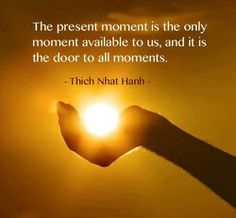
‘The present moment is the only moment available to us, and it is the door to all moments’ Thich Nhat Hanh
There are many books and audiobooks etc. available about Mindfulness meditation, but some of the most popular items are:
Wherever You Go, There You Are: Mindfulness Meditation for Everyday Life – this book is written by the father of modern day mindfulness – Jon Kabat-Zinn and he shows us how to cultivate mindfulness in our lives and awaken us to the possibilities of each present moment.
Guided Mindfulness Meditation (audio CD) – this audiobook is also read by Jon Kabat-Zinn and he explains how the power of mindfulness can bring change to our personal lives, and the world around us, from learning, growing and healing.
The Headspace Guide to Mindfulness & Meditation: 10 minutes can make the difference – this book is for beginners and expert meditators alike and it teaches skills to combat the negative aspects of our busy lives. These powerful techniques will help us to quiet the mind, feel less stressed and less tired and achieve calm and fulfilment.
Stress Less Cards – 50 Inspirational Mindfulness & Meditation Exercises – these cards contain 50 effective exercises to help us relieve stress and deal with anxiety whenever we need it. The techniques can be easily memorised and used anywhere to stop that stress reaction and help us relax.







